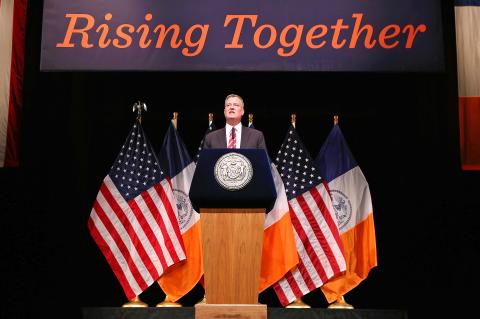Chinese Practice
水漲船高
(shui2 zhang3 chuan2 gao1)

Photo: AFP
照片:法新社
when the water level goes up, all boats rise
英文片語a rising tide lifts all boats一般多認為出自美國前總統甘迺迪於一九六三年發表的演講,意指經濟好時,經濟體中所有人皆可受惠。甘迺迪的演講撰稿人泰德索倫森在其後曾表示這個片語並非甘迺迪或他所創,而是他幾年前在一個地方商會的信紙上看到的。甘迺迪在演講上使用了這個片語,但不是這個片語的創始人。
A rising tide lifts all boats這個說法至今已有至少一世紀的歷史,在美國一九一○年代出版的宗教書報中額為常見。這個片語看似源自於某個臨海的漁村,同樣的濱海意境,與在其一千年前出現的中文成語「水漲船高」有異曲同工之妙。
在西元一千○四年,中國宋朝的釋道原撰寫《景德傳燈錄》,記錄了多名禪師與僧人的禪法。書中提及「水長船高,泥多佛大」。「水漲船高」用於形容某人或事物提升後,連帶讓仰賴其的人或事物也跟著提升。而「泥多佛大」亦可單獨使用,意指深穩的根基或支持能造就成功。
(台北時報編譯涂宇安譯)
這名歌手爆紅後,他的樂團身價也水漲船高,現在有多家唱片公司都想要挖角他們。
(After this singer became very popular, his whole band became really famous, too, and now lots of record companies are looking to poach them.)
英文練習
a rising tide lifts all boats
Former US president John F. Kennedy is often credited with the phrase “a rising tide lifts all boats,” from a speech he made in 1963. The phrase is understood to mean that favorable economic conditions will improve the lot of all participants in that economy. His own speechwriter, Ted Sorensen, later debunked the idea that Kennedy — or he himself for that matter — had come up with the phrase, noting that he had seen it on a regional chamber of commerce letterhead some years earlier. Kennedy did use it, but it didn’t originate with him.
There are numerous references to the phrase in print in religious publications dating to the 1910s in the US, making the phrase at least a century old. You would expect it to have originated, perhaps, in a coastal fishing community. A similar mental image certainly occurred to another writer in a different place and at a different time: in China, 1,000 years ago.
During the Song dynasty, in the year 1004AD, the monk Shi Daoyuan published a book called Complete Record of the Transmission of the Lamp, a record of Ch’an (Zen) masters and other prominent Buddhist monks. In it appear the words 「水長船高,泥多佛大」, meaning “when the water rises, the boats are lifted high; the more clay there is, the larger the Buddha [statue]. The idiom 水漲船高 is now used to express the idea that when a person or object advances, so do the people or things that rely on them. Interestingly, the second part of the phrase, 泥多佛大, can be used as an idiom in its own right, a reference to the importance of support for the success of a venture.
(Paul Cooper, Taipei Times)
The growing poverty gap in many countries suggests that a rising tide does not, in fact, lift all boats.
(許多國家的貧富差距都在增大,這顯示整體經濟提升並不會改善所有人的生活。)

When it comes to movies, some people delight in watching spine-chilling horror films. Surprisingly, apart from containing a few scares, horror movies may also offer an unexpected __1__. According to a study, watching 90 minutes of a scary movie can burn an average of 113 calories, which is roughly __2__ to taking a 30-minute walk. Researchers from the University of Westminster carried out an experiment in which they __3__ participants’ oxygen intake, carbon dioxide output, and heart rates while they were watching horror movies without any distractions. The results revealed that physiological responses to fear play a crucial role

In the vast landscapes of Australia, a unique and charming creature roams — the “wombat.” These round, adorable animals possess surprising abilities and fascinating traits that never fail to amaze. Let’s explore the world of this remarkable creature. Wombats are marsupials native to Australia, measuring around one meter in length and weighing between 20 and 35kg. Their fur varies in color, ranging from brown to gray to black. As herbivores, they primarily feed on grass, bark and roots. To adapt to Australia’s weather conditions, wombats have developed a slow metabolism and a leisurely pace. However, despite their bulky appearance,

Bilingual Story is a fictionalized account. 雙語故事部分內容純屬虛構。 Echo pulled out a worn and tattered shoe box under father’s large oak desk. “Mariko, what should we do with these family photos?” Mariko stared at the old box with a slightly hurt expression, and then blankly at the photos. “Throw them in the garbage pile. . . along with that old, ratty box,” she murmured. She resented that her father had not cared enough to find a nicer home for the family photos. “Father never really cared about me anyway.” Echo’s emotion sensor detected sorrow. ”Mariko, that is

Dos & Don’ts — 想想看,這句話英語該怎麼說? 1. 你覺得這部電影怎樣? ˇ What do you think of the movie? χ How do you like the movie? χ How do you think of the movie? 註︰What do you think of = What is your opinion of。 think 的受詞是 what,不能用 how。 2. 你認為哪一個歌星唱得最好? ˇ Which singer do you think is the best? χ Do you think which singer is the best? 註︰英語中 which singer 似乎是 do you think 的受詞,實則 do you think 是插入語,其他例子如下: 你以為他喜歡誰? Who do you think he likes? 你以為我住在哪裏? Where do you think I live? 你想我昨天在公園裏碰到了誰? Whom/Who do you think I met in the park yesterday? 3. 他不論到什麼地方,總是帶著一把雨傘。 ˇ No matter where he goes, he